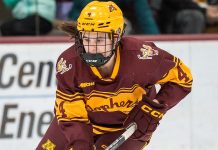Alaska-Anchorage assistant coaches Jack Kowal and Keith Morris resigned this week after UAA head coach Dave Shyiak called them into his office this past week and told them that their contracts were not going to be renewed per a report in the Anchorage Daily News.
Shyiak just completed his first season as the head coach for the Seawolves and apparently has decided to go in a different direction after adhering to a policy of UAA Athletic Director Steve Cobb’s in that new head coaches retain assistants for at least one year after taking over a program.
The two former assistants are not happy as they told Woody Doyle of the Anchorage Daily News.
“All head coaches have a right to have their own staff,” Kowal told Doyle. “That aside, we’re two alumni, two former captains, two graduates. There’s a respect factor.
“Give us a heads-up so we can pursue another job. We’re not a couple of guys from Seattle or somewhere. We busted our butts here.”
“There’s a way to treat people and deal with a situation like this, so there’s a smooth transition (at UAA) and that gives us the best possible chance to transition to a new job,” Morris told Doyle.
“In the short term, there’s a lot of disappointment. Certainly, if the process had been dealt with differently, the disappointment wouldn’t be so great.”
Kowal and Morris told Doyle that had they been told sooner, they would have paid their own way to Florida for the AHCA Convention that just took place.
“This situation probably could have been handled better, and I take responsibility for that,” Cobb told Doyle. “Having said that, most personnel decisions can probably be handled better in hindsight.
“I think they got a little bit of late notice and we did something to offset that, and that’s about all I can say about it.”
Kowal has been an assistant at UAA for five season and grew up in Anchorage while Morris has been with the Seawolves for three seasons.
“Both of us want to stay in hockey,” Morris said, “but in the short term what we’d like to do is take care of our families.”
That may mean getting into a new line of work.
“And when you’re out of hockey, very rarely do people get a chance to get back into it,” Kowal said.

